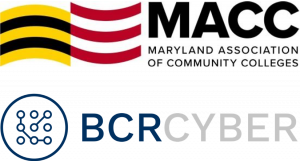Maryland Association of Community Colleges Receives Funding for the Cyber Workforce Accelerator
Partnership with BCR Cyber Will Provide Jobs and Access to Advanced Experiential Training at Maryland Community Colleges
BALTIMORE, MARYLAND, UNITED STATES, June 25, 2024 /EINPresswire.com/ -- The Maryland Association of Community Colleges (MACC)3, in partnership with Baltimore Cyber Range dba BCR Cyber1, has been awarded $935,680 through the Maryland Department of Commerce’s “Build Our Future Grant Pilot Program2” to fund the Cybersecurity Workforce Accelerator. This award leverages the $2 million of Congressionally Directed Spending obtained by U.S. Senators Ben Cardin and Chris van Hollen that was allocated for the Accelerator earlier this year in the Federal FY25 Budget as matching funds, bringing the total amount awarded year to date for the Cyber Workforce Accelerator to $2.9 million.Together, MACC and BCR Cyber developed the Cyber Workforce Accelerator to dramatically expand Maryland workforce development efforts and provide the state’s community colleges with BCR Cyber Series 3000 Cyber Ranges, giving access to advanced experiential training and education technology to train and certify thousands of entry level IT and cyber practitioners. The Cyber Workforce Accelerator will be available to both credit and non-credit students enrolled at Maryland community colleges.
The grant award facilitates the procurement, configuration, and deployment of the cyber ranges, as well as required community college and server facility infrastructure upgrades, enhancements, and staff training. Delivery of the cyber ranges and training commencement is expected by April 1, 2025.
As a function of this effort, a public-private consortium of 35+ cybersecurity companies and government agencies will steer course content development and recruit entry-level employees trained at the community college cyber ranges. Each of these entities have pledged significant leveraged resources to this project.
According to Dr. Brad Phillips, Executive Director of MACC, “The goal is to place cyber ranges in community colleges across the State to be used for workforce development in cybersecurity. This will place Maryland as the first state in the nation to use range technology for workforce development, which will diversify the workforce and accelerate closing the workforce skills gap. I strongly believe what we are doing should become a model for the nation.”
This initiative builds on the federally funded “Cyber Pathways Across Maryland” (CPAM) program infrastructure and BCR Cyber via Maryland Department of Labor Employment Advancement Right Now (EARN) programs. For more than five years, BCR Cyber has worked with the EARN program and Maryland community colleges to establish an IT and cybersecurity workforce development pipeline. More than 1,000 Maryland residents have been trained, certified, and placed through the pipeline.
“Our work with MACC to deploy these additional cyber ranges not only helps meet the critical need to fill more than 30,000 cybersecurity job openings in Maryland, but also creates thousands of potentially life-changing career opportunities for Marylanders. We are extremely grateful to the Moore-Miller Administration and the Department of Commerce for recognizing the need to dramatically expand Maryland’s cybersecurity workforce with this innovative public-private partnership,” says BCR Cyber President Michael Spector.
BCR Cyber has established a wide range of strategic relationships with state and federal IT departments, allowing them to deliver cutting-edge cybersecurity training to their employees. Collaborating closely with these government entities, BCR Cyber is enabling them to strengthen their cybersecurity posture while fostering a culture of continuous learning and improvement.
Additionally, BCR Cyber holds exclusive responsibility for conducting technical proficiency testing for third-party assessment organizations (3PAOs), as required by the Federal Risk and Authorization Management Program (FedRAMP). BCR Cyber testing ensures these organizations meet the standards necessary to assess and authorize cloud service providers for federal agencies.
The Build Our Future Grant Pilot Program was established through The Innovation Economy Infrastructure Act of 2023 as a key piece of Maryland Governor Moore’s plan to bridge the gap between vision and success in the state. Grants are awarded to private companies, nonprofit entities, local governments, or colleges and universities in Maryland. Eligible projects include cyber ranges, prototype manufacturing centers, research spaces, sensitive compartmented information facilities, and wet laboratories, among others.
About Maryland Association of Community Colleges
Maryland Association of Community Colleges (MACC) is an advocate for Maryland’s 16 community colleges and the needs of the students they serve. State-of-the-art facilities, flexible curricula, and award-winning teaching staff serve full- and part-time students pursuing academic degrees, career certifications, and enrichment courses at 22 campuses and 1000+ learning sites statewide. See more at mdacc.org.
About BCR Cyber
Established in 2017, BCR Cyber (formerly Baltimore Cyber Range) is dedicated to delivering exceptional training solutions to both government and commercial clients. BCR Cyber has trained thousands of individuals and successfully placed over 83 percent into employment. The BCR Cyber Range is the first such facility in the world specifically dedicated to workforce development in the cybersecurity sector. BCR Cyber provides trainees with the most advanced cybersecurity strategies and techniques in an environment that simulates real threats in real-time. The range's hands-on training encompasses cyber threat detection, compromise mitigation, and system remediation, and is complemented by placement services. For more information, visit www.bcrcyber.com.
Matthew Pugh
Pugh & Tiller PR for BCR Cyber
+1 443-527-1552
email us here
Visit us on social media:
LinkedIn
1 https://bcrcyber.com/
2 https://commerce.maryland.gov/fund/build-our-future-grant-program
3 https://mdacc.org/

